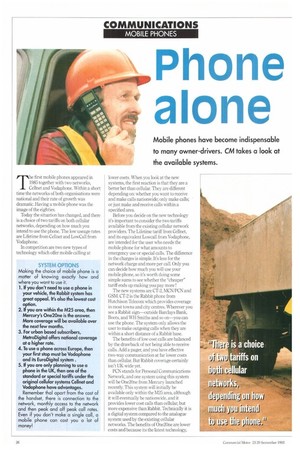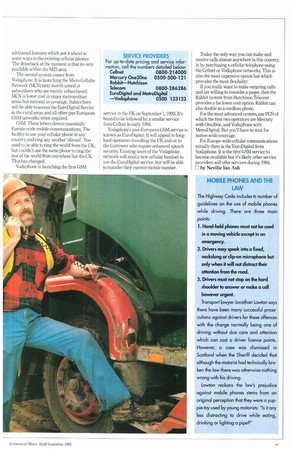,Phone
Page 28

Page 29

If you've noticed an error in this article please click here to report it so we can fix it.
44 alone
Mobile phones have become indispensable to many owner-drivers. CM takes a look at the available systems.
The first mobile phones appeared in 1985 together with two networks, Cellnet and Vodaphone. Within a short time the networks of both organisations were national and their rate of growth was dramatic. Having a mobile phone was the image of the eighties.
Today the situation has changed, and there is a choice of two tariffs on both cellular networks, depending on how much you intend to use the phone. The low useage rates are Lifetime from Cellnet and LowCall from Vodaphone.
In competition are two new types of technology which offer mobile calling at
lower costs. When you look at the new systems, the first reaction is that they are a better bet than cellular. They are different depending on: whether you want to receive and make calls nationwide; only make calls; or just make and receive mils within a specified area.
Before you decide on the new technology it's important to consider the two tariffs available from the existing cellular network providers. The Lifetime tariff from Cellnet, and its equivalent Lowcall from Vodaphone, are intended for the user who needs the mobile phone for what amounts to emergency use or special calls. The difference in the charges is simple. It's less for the network charge and more per call. Only you can decide how much you will use your mobile phone, so it's worth doing some simple sums to see whether the "cheaper" tariff ends up making you pay more!
The new systems are CT-2, MCN/PCN and GSM. CT-2 is the Rabbit phone from Hutchison Telecom which provides coverage in most towns and city centres. Wherever you see a Rabbit sign—outside Barclays Bank, Boots, and WH Smiths and so on—you can use the phone. The system only allows the user to make outgoing mils when they are within a short distance of a Rabbit base.
The benefits of low-cost calls are balanced by the drawback of not being able to receive calls. Add a pager, and you have effective two-way communication at far lower costs than cellular. But Rabbit coverage certainly isn't UK-wide yet.
PCN stands for Personal Communications NETwork, and one system using this system .vill be One2One from Mercury launched recently. This system will initially be available only within the M25 area, although it will eventually be nationwide, and it provides lower cost calls than cellular, but more expensive than Rabbit. Technically it is a digital system compared to the analogue system used by the existing cellular networks. The benefits of One2One are lower costs and because its the latest technology, additional features which put it ahead in some ways to the existing cellular phones. The drawback at the moment is that its only available within the M25 area.
The second system comes from Vodaphone. It is launching the Micro Cellular Network (MCN) next month aimed at subscribes who are mainly urban based. MCN is lower cost in major metropolitan areas but national in coverage. Subscribers will be able to access the EuroDigital Service in the rural areas and all other pan European GSM networks when required.
GSM. These letters denote essentially Europe-wide mobile communications. The facility to use your cellular phone in any country and ring any another 'abroad'. You used to be able to ring the world from the UK, but couldn't use the same phone to ring the rest of the world from anywhere but the UK. This has changed.
Vodaphone is launching the first GSM service in the UK on September 1, 1993. It's bound to be followed by a similar service from Cellnet in early 1994.
Vodaphone's pan-European GSM service is known as EuroDigital. It will appeal to longhaul operators travelling the UK and on to the Continent who require enhanced speech security. Existing users of the Vodaphone network will need a new cellular handset to use the EuroDigital service, but will be able to transfer their current mobile number. Today the only way you can make and receive calls almost anywhere in this country, is by purchasing a cellular telephone using the Cellnet or Vodaphone networks. This is also the most expensive option but which provides the most flexibility If you really want to make outgoing calls and are willing to consider a pager, then the Rabbit system from Hutchison Telecom provides a far lower cost option. Rabbit can also double as a cordless phone.
For the most advanced system, use PCN of which the first two operators are Mercury with Onea)ne, and Vodaphone with MetroDigital. But you'll have to wait for nation-wide coverage.
For Europe-wide cellular communications initially there is the EuroDigital from Vodaphone. It is the first GSM service to become available but it likely other service providers will offer services during 1994. 0 by Neville lan Ash
















































































